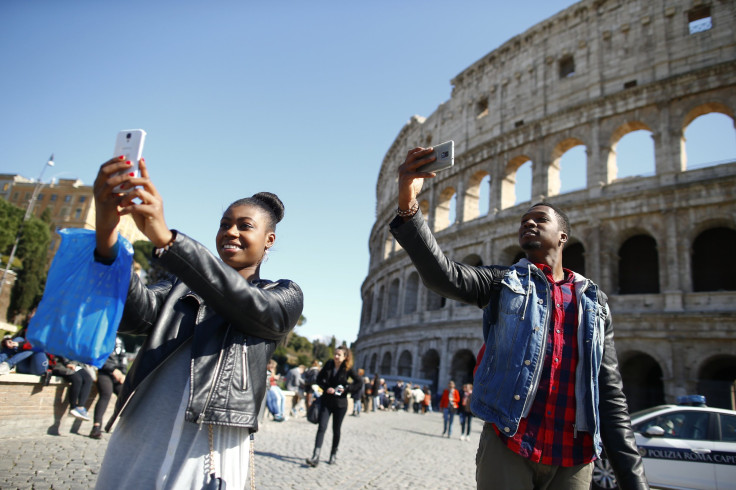Selfies more deadly than sharks according to 2015 stats

A report claims that the death toll for selfie-related incidents this year is higher than shark attacks, with 12 selfie-related deaths around the world compared to the recent report of the Global Shark Attack File of eight deaths by shark attacks in 2015.
These selfie-related accidents include distracted people falling off cliffs, being hit by trains, crashing their cars and unintendedly shooting themselves while posing with guns.
The latest reported death linked with a selfie was at the Taj Mahal, where a 66-year-old Japanese tourist suffered a heart attack while posing with a selfie stick at the site earlier in September. Another recently reported death was a 19-year-old from Houston, Texas, who shot himself in the neck while posing for a selfie.
In Russia, a 21-year-old woman also shot herself in the head while taking a selfie with a 9mm pistol pointed at her temple. However, the woman reportedly survived the incident.
Aside from gun-firing incidents, there were also reports of people who died falling from high places while taking photos of their own. In May, a Singaporean tourist fell from a cliff off the coast of Bali in Indonesia, followed by a 21-year-old university graduate who died in June after falling 40 feet while posing hanging from a Moscow bridge.
Some of the selfie-related deaths also involved vehicular accidents, like the 32-year-old woman from the United States who crashed her car minutes after taking a selfie and posting it on Facebook. A teenager in Ryazan, Russia, died after being electrocuted with live wires while trying to take a picture near to railway tracks.
The growing trend of selfie-related accidents has sparked several interventions from different countries to stop the risk-taking attitude of people. In July, the Russian government initiated a campaign to raise awareness to the public about the dangers of selfies after hundreds of injuries were reported. Prior to the campaign, two men in Russia’s Ural Mountains accidentally killed themselves while taking a selfie, posing while pulling the pin from a hand grenade.
“Unfortunately we have noted recently that the number of accidents caused by lovers of self-photography is constantly increasing,” a government aide said at the launch of the selfie safety campaign. “Since the beginning of the year we are talking about some hundred cases of injuries for sure.”
Selfies with wild animals have also spurred authorities to respond to the growing trend. Officials of the Yellowstone National Park in the US have released warnings when five incidents of selfie-takers were reported being attacked while standing near a bison. A park in Denver has also temporarily closed due to the growing number of visitors coming too close to bears to take selfies.
In Australia, officials fenced off a 16-storey-high rock landmark nicknamed the Wedding Cake Rock, after people kept taking photos on it despite warnings that it could collapse at any time. A "no selfie zone" will also be implemented by officials in India during the Hindu Kumbh Mela festival over concerns taking selfies may cause a stampede.
In addition to landmarks being physically protected, a law was proposed by the European Union earlier in 2015 to criminalise the sharing of photographs of landmarks such as the Eiffel Tower and Rome's Trevi Fountain.
Despite the number of reported incidents and the growing number of nations implementing selfie interventions, a report from the Washington Post criticised the idea of comparing the risks of taking a selfie to shark attacks. The report described the idea as “crazy” and “surprising”, noting that “it also makes no sense” to compare the two.
“After all, people get injured as a result of their distractions every day,” it stated. “Someday, I presume, those obsessions will fade, and we’ll start treating our phones like just another tool. Until that day, however, please relax: Your selfies are not killing you,” author Caitlin Dewey wrote.
However, data from Google Trends shows that selfies more popular than ever. In fact, 2014 was named "The Year of the Selfie," after searches for the “selfie” term increased eight times during that period, Reuters reported.
Contact the writer at feedback@ibtimes.com.au or tell us what you think below





















